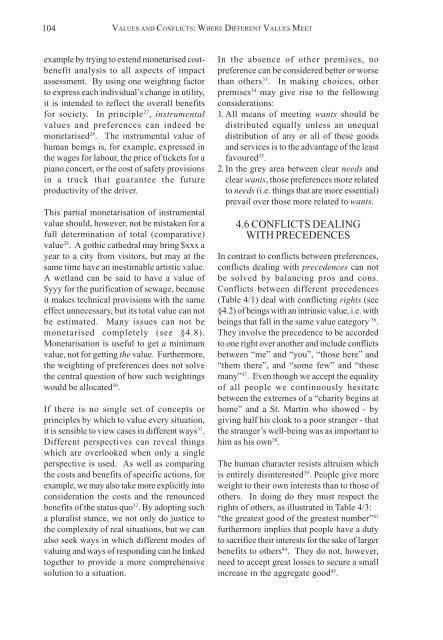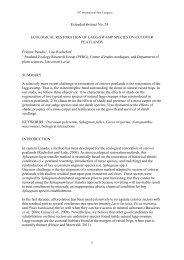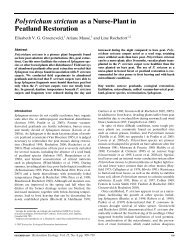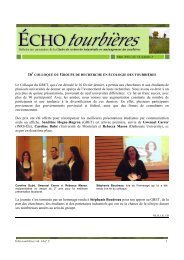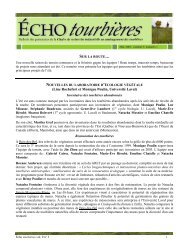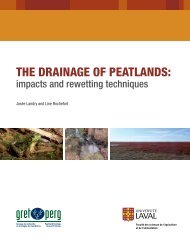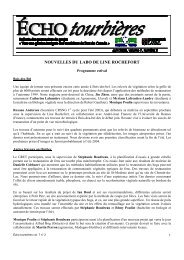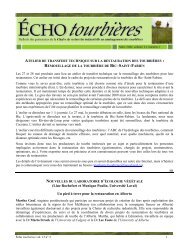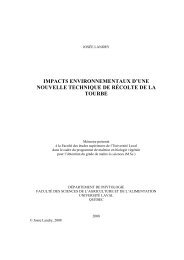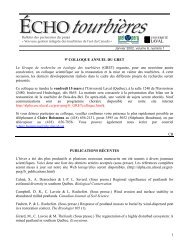wise use of mires and peatlands - Peatland Ecology Research Group
wise use of mires and peatlands - Peatland Ecology Research Group
wise use of mires and peatlands - Peatland Ecology Research Group
You also want an ePaper? Increase the reach of your titles
YUMPU automatically turns print PDFs into web optimized ePapers that Google loves.
104 VALUES AND CONFLICTS: WHERE DIFFERENT VALUES MEETexample by trying to extend monetarised costbenefitanalysis to all aspects <strong>of</strong> impactassessment. By using one weighting factorto express each individual’s change in utility,it is intended to reflect the overall benefitsfor society. In principle 27 , instrumentalvalues <strong>and</strong> preferences can indeed bemonetarised 28 . The instrumental value <strong>of</strong>human beings is, for example, expressed inthe wages for labour, the price <strong>of</strong> tickets for apiano concert, or the cost <strong>of</strong> safety provisionsin a truck that guarantee the futureproductivity <strong>of</strong> the driver.This partial monetarisation <strong>of</strong> instrumentalvalue should, however, not be mistaken for afull determination <strong>of</strong> total (comparative)value 29 . A gothic cathedral may bring $xxx ayear to a city from visitors, but may at thesame time have an inestimable artistic value.A wetl<strong>and</strong> can be said to have a value <strong>of</strong>$yyy for the purification <strong>of</strong> sewage, beca<strong>use</strong>it makes technical provisions with the sameeffect unnecessary, but its total value can notbe estimated. Many issues can not bemonetarised completely (see §4.8).Monetarisation is <strong>use</strong>ful to get a minimumvalue, not for getting the value. Furthermore,the weighting <strong>of</strong> preferences does not solvethe central question <strong>of</strong> how such weightingswould be allocated 30 .If there is no single set <strong>of</strong> concepts orprinciples by which to value every situation,it is sensible to view cases in different ways 31 .Different perspectives can reveal thingswhich are overlooked when only a singleperspective is <strong>use</strong>d. As well as comparingthe costs <strong>and</strong> benefits <strong>of</strong> specific actions, forexample, we may also take more explicitly intoconsideration the costs <strong>and</strong> the renouncedbenefits <strong>of</strong> the status quo 32 . By adopting sucha pluralist stance, we not only do justice tothe complexity <strong>of</strong> real situations, but we canalso seek ways in which different modes <strong>of</strong>valuing <strong>and</strong> ways <strong>of</strong> responding can be linkedtogether to provide a more comprehensivesolution to a situation.In the absence <strong>of</strong> other premises, nopreference can be considered better or worsethan others 33 . In making choices, otherpremises 34 may give rise to the followingconsiderations:1. All means <strong>of</strong> meeting wants should bedistributed equally unless an unequaldistribution <strong>of</strong> any or all <strong>of</strong> these goods<strong>and</strong> services is to the advantage <strong>of</strong> the leastfavoured 35 .2. In the grey area between clear needs <strong>and</strong>clear wants, those preferences more relatedto needs (i.e. things that are more essential)prevail over those more related to wants.4.6 CONFLICTS DEALINGWITH PRECEDENCESIn contrast to conflicts between preferences,conflicts dealing with precedences can notbe solved by balancing pros <strong>and</strong> cons.Conflicts between different precedences(Table 4/1) deal with conflicting rights (see§4.2) <strong>of</strong> beings with an intrinsic value, i.e. withbeings that fall in the same value category 36 .They involve the precedence to be accordedto one right over another <strong>and</strong> include conflictsbetween “me” <strong>and</strong> “you”, “those here” <strong>and</strong>“them there”, <strong>and</strong> “some few” <strong>and</strong> “thosemany” 37 . Even though we accept the equality<strong>of</strong> all people we continuously hesitatebetween the extremes <strong>of</strong> a “charity begins athome” <strong>and</strong> a St. Martin who showed - bygiving half his cloak to a poor stranger - thatthe stranger’s well-being was as important tohim as his own 38 .The human character resists altruism whichis entirely disinterested 39 . People give moreweight to their own interests than to those <strong>of</strong>others. In doing do they must respect therights <strong>of</strong> others, as illustrated in Table 4/3:“the greatest good <strong>of</strong> the greatest number” 43furthermore implies that people have a dutyto sacrifice their interests for the sake <strong>of</strong> largerbenefits to others 44 . They do not, however,need to accept great losses to secure a smallincrease in the aggregate good 45 .


